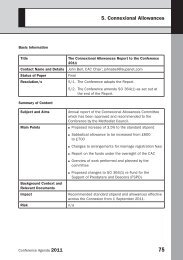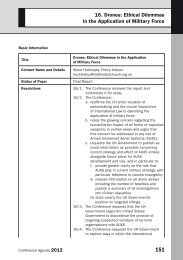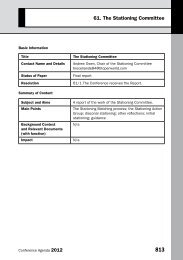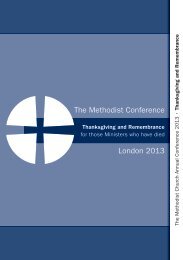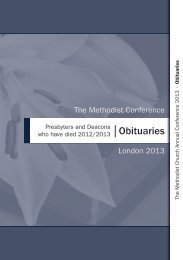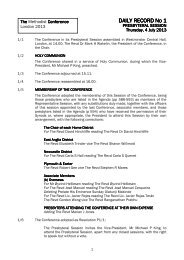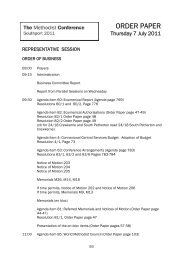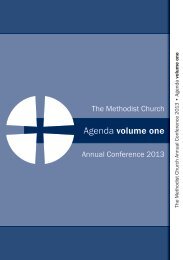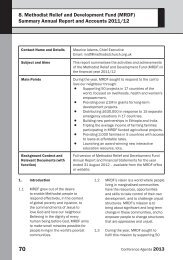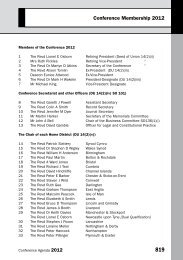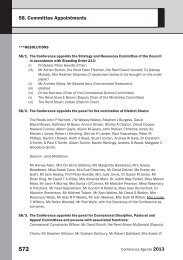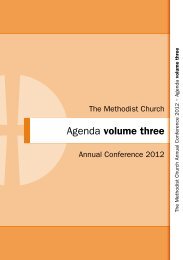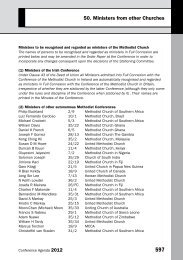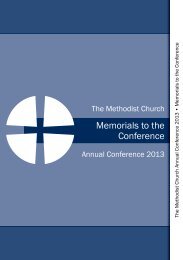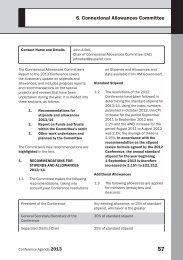Agenda Volume 2 - Methodist Conference
Agenda Volume 2 - Methodist Conference
Agenda Volume 2 - Methodist Conference
You also want an ePaper? Increase the reach of your titles
YUMPU automatically turns print PDFs into web optimized ePapers that Google loves.
49. Review of the Membership of the <strong>Conference</strong><br />
brought than might otherwise be<br />
the case. The subsequent Report<br />
in 2007 recommended that over a<br />
period of three years the number of<br />
<strong>Conference</strong>-elected representatives<br />
be reduced from eighteen to nine;<br />
four of whom should be presbyters,<br />
four lay and one a deacon. This was<br />
accepted, and is now the case.<br />
3.8.2 The Working Party considered<br />
whether the time had come to<br />
propose abolishing this category of<br />
membership. A questionnaire was<br />
sent to Synod Secretaries in order<br />
to capture how much continuity of<br />
membership is provided by some<br />
district representatives serving for<br />
three years. All but 6 of 31 responded.<br />
The results show that approximately<br />
25% of district representatives are<br />
elected for a term of three years.<br />
Additionally, some districts elect a<br />
number of representatives for two<br />
years and other districts report that<br />
representatives elected for one year<br />
often stand again. Overall, it seems<br />
that districts find it easier to elect a<br />
small number for three years than a<br />
larger number for one year. There is<br />
therefore a considerable measure<br />
of continuity, and consequently<br />
experience, among Synod-elected<br />
representatives that makes it difficult<br />
to argue for the continuation of the<br />
category of <strong>Conference</strong>-elected<br />
members, on these grounds. The<br />
argument that might weigh in favour<br />
of retaining it is that <strong>Conference</strong><br />
can by this means elect people who<br />
have specific areas of experience or<br />
expertise that can add value to the<br />
business of the <strong>Conference</strong>. Both<br />
circuit meetings (SO 510(1)(ix)) and<br />
church councils (SO 610(1)(xi)) are<br />
entitled to elect people with particular<br />
skills or experience onto their<br />
membership. On balance, the Working<br />
Party concluded that the category<br />
should remain, and at the current<br />
number of nine.<br />
3.8.3 At this point we return to the subject<br />
of the Memorials Committee.<br />
Careful and informed scrutiny of the<br />
draft replies to memorials requires<br />
experience and knowledge. Some<br />
members appointed by the Districts<br />
to the Memorials Committee have<br />
not yet attended the <strong>Conference</strong><br />
and may never have served on a<br />
connexional committee. They are<br />
often nominated because they<br />
are willing and able to attend. The<br />
Working Party consider that the<br />
Committee is too large and often too<br />
inexperienced to work effectively.<br />
Although this is strictly outside our<br />
remit, the Working Party would like to<br />
test the mind of <strong>Conference</strong> on the<br />
possibility of asking the <strong>Conference</strong>elected<br />
representatives to contribute<br />
their expertise and experience by<br />
serving on the Memorials Committee<br />
in place of representatives appointed<br />
by district Policy Committees.<br />
Accordingly we have included a draft<br />
Resolution to this effect.<br />
4 Representatives of connexional<br />
and other bodies<br />
4.1 DU 14(2)(x) and SO 102(1) For the<br />
reasons given below, we recommend<br />
536<br />
<strong>Conference</strong> <strong>Agenda</strong> 2013



